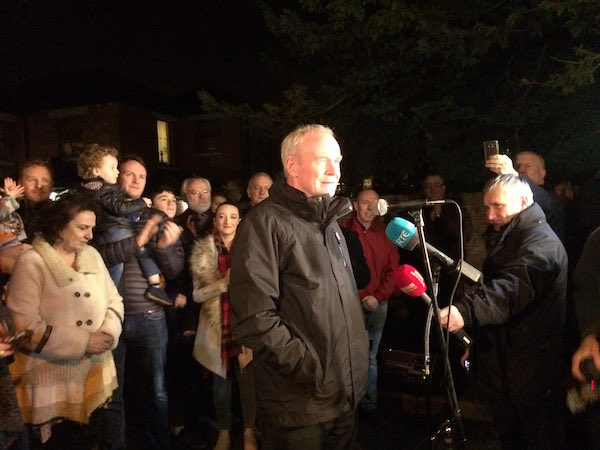
An emotional Martin McGuinness has said he wants to become an ambassador for peace after the former Sinn Fein deputy First Minister quit electoral politics this week due to ill-health.
Mr McGuinness, who is 66 years of age and visibly frail, said on Thursday that a serious illness had prevented him from defending his seat in the Stormont Assembly. He said he was no longer physically capable of fighting an election but insisted his involvement in politics was not entirely over.
He said: “I’ve had a lot of thinking to do in recent weeks. I’ve had to think of my wife, Bernie, my family, the doctors and nurses caring for me, my party, the people of Derry, people across Ireland who consider me one of the leaders of the peace process and, in doing that, I’ve come to realise that I would have to be very honest and fair to all of them.
“I also had to be honest with myself. I had to ask myself, ‘Are you in a fit state to fight an election?’ and the answer was a simple one: no, I’m not physically able to fight an election.”
“On balance, I feel the decision that was most in the interests of the people at this time is that they don’t need someone fighting an election who they know is very clearly seriously ill and dealing with an illness that is taking it toll.”
Mr. McGuinness said that, while his decision signalled the end of his life in electoral politics, it wasn’t the end of his political life. “I hope I can still be an ongoing ambassador for the reunification of Ireland, for peace and for reconciliation. So, the message is: I’m not going away, you know.”
TRIBUTES
There were tributes from across the political spectrum following the announcement.
Sinn Fein president Gerry Adams added: “I want to express my heartfelt thanks to Martin McGuinness. He and I first met over 45 years ago behind the barricades in Free Derry and we have been friends and comrades since that time.”
He added: “Martin has said he wants to come back and be part of the process to end partition, build reconciliation, unite our people and achieve Irish unity.
“So on behalf of Sinn Fein and republicans everywhere I want to send him our best wishes.”
Britain’s governor in Ireland, James Brokenshire paid tribute to the former Deputy First Minister. He said: “I thank him on behalf of the government for his work in securing a number of significant political agreements, as well as his service as deputy first minister of Northern Ireland.”
Taoiseach Enda Kenny said he “readily acknowledged the remarkable political journey” Mr McGuinness undertook.
“I know that Martin remains firmly committed to delivering a peaceful and prosperous society for all of the people of Northern Ireland,” he said. “He was one of the key architects of the Good Friday Agreement, and a tireless and committed champion of the peace process.”
Fianna Fail leader Micheal Martin said Mr McGuinness had been a constructive force for good. “We wish Martin McGuinness well and hope that those assuming leadership roles in Sinn Fein in Northern Ireland will learn from his example over the last 10 years and renew the commitment to making these institutions work,” he said.
DUP leader Arlene Foster paid a more restrained tribute. Mrs Foster said the pair “come from very different angles of vision”.
“Despite all that has happened I wish Martin McGuinness a speedy recovery and that he and his wife are able to enjoy time with their family away from the relentless focus of public life,” she said.
In contrast, Ian Paisley Jr, a more peripheral figure in the DUP since his father’s retirement, was widely praised for a fulsome tribute to a man who he said had completed a “remarkable journey” to bring normalisation to the north of Ireland.
Mr Paisley said he wanted to say “thank you” to Mr McGuinness. “It is important that we, actually, do reflect on the fact that we would not be where we are in Northern Ireland, in terms of having stability, peace and the opportunity to rebuild our country, were it not for the work he did put in, especially with my father at the beginning of this long journey,” he said.
‘DISAPPOINTMENT’
Mr McGuinness announced his resignation as deputy first minister last Monday in protest over the renewable heat scandal. His illness came as his long-standing efforts to appease unionism finally collapsed and he finally pulled the plug on a coalition government which had become disgraced by serial scandals over unionist corruption, incompetence and inequality.
In his resignation statement, he said he had worked in government alongside DUP leaders for ten years and in that time the British government and DUP had “undermined the institutions and eroded public confidence”.
He insisted that Sinn Fein was not finished with Stormont’s power-sharing project but again repeated the party’s electoral slogan that it “would not be going back to the status quo”.
“A lot depends on the DUP but also the British government and whether they can change their attitude,” he said. “I believe a solution can be found but it has to be a genuine solution, it can’t be fake.”
He added that he was deeply disappointed that his efforts to keep the devolved institutions alive had not succeeded. “After 10 years of trying everything to ensure we would get a change of attitude it is very disappointing.”
![[Irish Republican News]](https://republican-news.org/graphics/title_gifs/rn.gif)
![[Irish Republican News]](https://republican-news.org/graphics/title_gifs/harp.gif)

